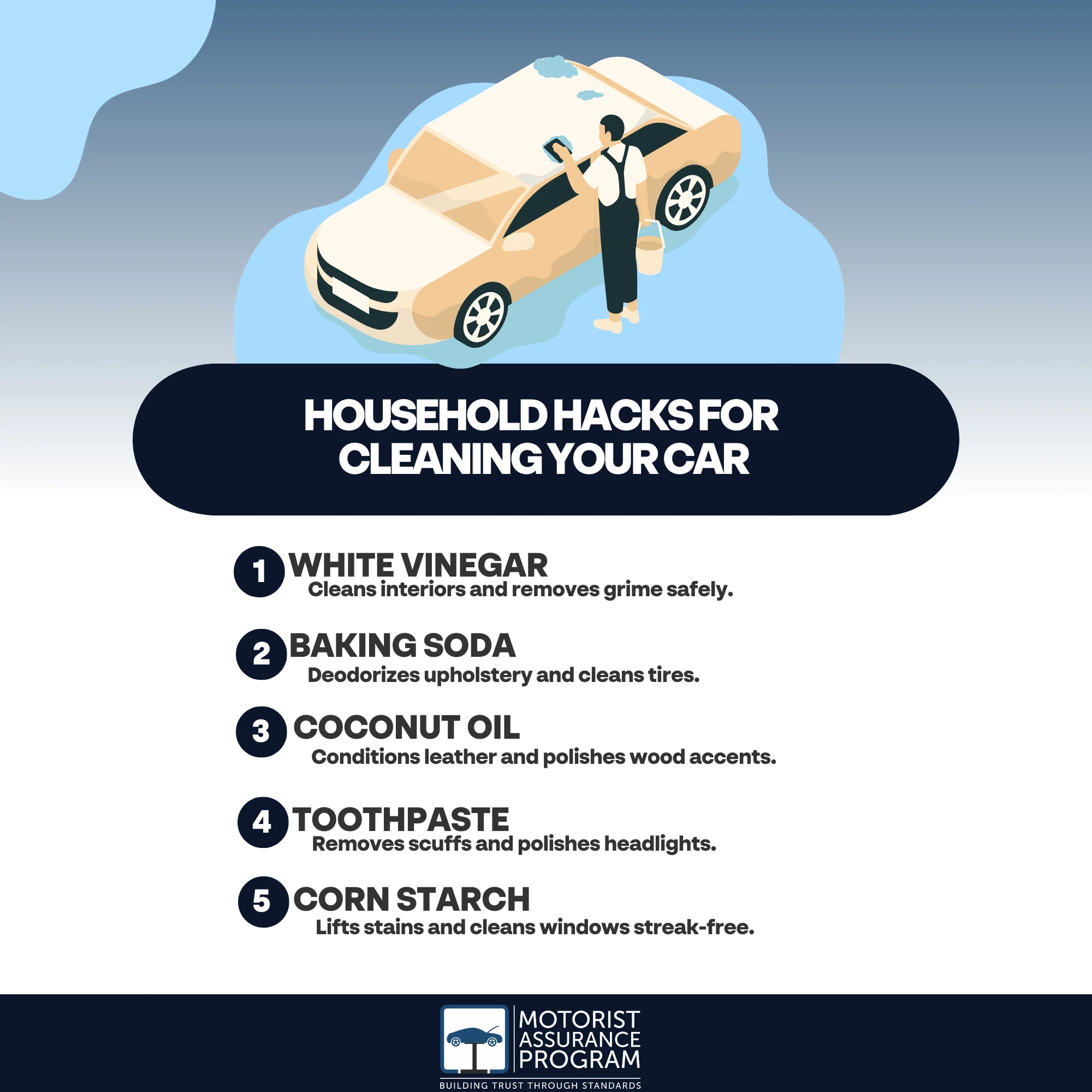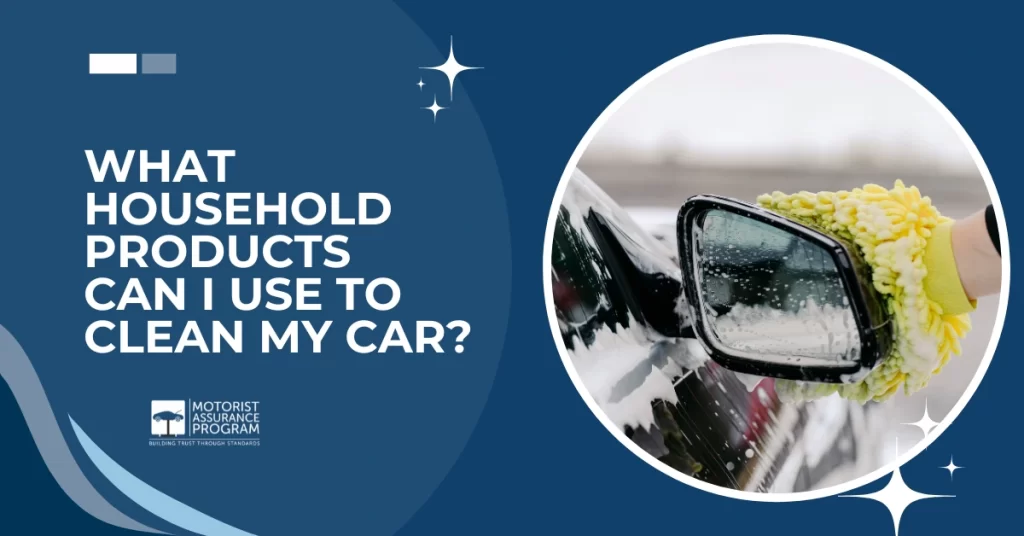You can clean your car effectively with simple household products. White vinegar works wonders for both inside and outside; just mix it with water. Baking soda removes odors and scrubs surfaces. For leather, use coconut oil, while toothpaste can tackle scuffs and foggy headlights. Rubbing alcohol is great for stains and disinfecting. Corn starch lifts dirt from upholstery, and peanut butter removes sticky residues. If you’re looking for a fresh scent, combine water with cinnamon oil. These eco-friendly solutions not only make your car shine but also help you avoid harsh chemicals, and there’s more to explore on this topic.

Key Takeaways
- White Vinegar: Mix equal parts vinegar and water for interior cleaning; use a diluted solution for exterior surfaces to remove grime and odors.
- Baking Soda: Create a paste for cleaning wheels and tires, or sprinkle on fabric seats to absorb odors effectively.
- Dish Soap: Dilute with water to clean grease and oil from wheels, while maintaining the car’s paint finish.
- Coconut Oil: Use to condition leather seats and polish wood accents, keeping surfaces moisturized and preventing cracks.
- Toothpaste: Apply non-gel toothpaste to minor scratches and foggy headlights for polishing; rinse thoroughly to avoid residue.
White vinegar
When it comes to cleaning your car with household products, white vinegar stands out as an effective and versatile choice. It’s not just great for cooking; it’s a powerful cleaning agent for both your car’s interior and exterior.
For your car interior, mix equal parts of water and white vinegar in a spray bottle. This solution works wonders on fabric seats, carpets, and even the dashboard. Just spray it on the surfaces, wipe with a microfiber cloth, and watch the dirt and odors disappear.
When addressing the exterior, white vinegar can help remove grime and road salt. Combine one part vinegar with three parts water in a spray bottle, and apply it to the car’s surface. Use a sponge or soft cloth to gently scrub, then rinse with water. This method effectively cleans without damaging your car’s paint.
Utilizing white vinegar answers the question, “What household products can I use to clean my car interior?” and provides a simple solution among household products to clean car exterior.
It’s eco-friendly, cost-effective, and readily available, making it a top choice for any car cleaning task.
Coconut oil
Alongside white vinegar, coconut oil is another household product that can effectively clean and condition various surfaces in your car. You can use coconut oil to clean the inside of your car by applying it to a soft cloth and wiping down leather seats. This natural oil not only removes dirt but also moisturizes the leather, preventing cracks and prolonging its lifespan.
Additionally, coconut oil is great for polishing wood accents in your car’s interior. Just dab a small amount on a cloth, and gently buff the surfaces to restore their shine. Be sure to avoid over-saturating the cloth, as too much oil can leave a greasy residue.
When considering what household products can I use to clean the inside of my car, don’t forget about coconut oil’s versatility. It can also help eliminate minor scratches on the dashboard and other plastic surfaces when used sparingly.
Incorporating household products to clean car interior surfaces not only saves you money but also reduces your exposure to harsh chemicals.
Corn starch
Although you mightn’t think of corn starch as a cleaning agent, it’s surprisingly effective for maintaining your car’s interior. This versatile household product can help you tackle several cleaning tasks with ease.
For instance, you can use corn starch to clean your upholstery and carpets. Simply sprinkle a generous amount on the stained area, let it sit for about 30 minutes, and then vacuum it up. The corn starch absorbs moisture and helps lift dirt, making it one of the best household products to clean car interior surfaces.
Additionally, corn starch can be used to clean your car’s windows. Mix it with water to create a paste, apply it to the glass, and then wipe it off with a soft cloth. This method leaves your windows sparkling without streaks.
When considering what household products can I use to clean my car exterior, corn starch may not be the first thing that comes to mind, but it certainly has its place.
Toothpaste
Toothpaste is an unexpected but effective household product for cleaning various surfaces in your car. You might wonder, “What household products can I clean my car with?” Well, toothpaste can tackle scuffs and minor scratches on your car’s exterior, making it one of the best household products to clean car exterior.
To use toothpaste for cleaning, pick a non-gel, white variety for the best results. Apply a small amount directly onto the scuffed area or a microfiber cloth. Gently rub it in a circular motion, allowing the mild abrasives in the toothpaste to polish the surface. After a minute or so, wipe away the residue with a damp cloth, and you’ll notice a significant improvement.
Additionally, toothpaste can work wonders on foggy headlights. Apply it in the same way, and you’ll restore clarity to your lights, enhancing visibility. Just remember to rinse thoroughly afterward to prevent any residue buildup.
Rubbing alcohol
Rubbing alcohol is another versatile household product that can greatly aid in cleaning your car. You can use it to tackle various cleaning tasks, particularly for the interior.
To clean the interior of your car with household products, simply mix equal parts of rubbing alcohol and water in a spray bottle. This solution is effective for wiping down surfaces, such as the dashboard, door panels, and center console. Just spray the solution on a microfiber cloth and wipe away the grime.
When it comes to your car tires, rubbing alcohol can help remove stubborn stains and dirt. While it’s not a replacement for dedicated tire cleaners, it can be quite handy.
Simply dampen a cloth with rubbing alcohol and scrub the tire sidewalls to lift away any embedded grime. However, make sure you follow up with a thorough rinse to avoid any residue.
Using rubbing alcohol not only cleans but also disinfects surfaces, making it a smart choice for maintaining your vehicle’s hygiene.
Baking soda
Baking soda is a powerful and versatile cleaning agent that can greatly enhance your car cleaning routine. When you’re considering what household products can I use to wash my car, baking soda should be at the top of your list.
It’s not only effective but also safe for various surfaces in your vehicle.
Here are a few ways you can use baking soda to clean your car:
- Upholstery Cleaner: Sprinkle baking soda on fabric seats and carpets, let it sit for 15 minutes, then vacuum. It helps absorb odors and freshen up the interior.
- Wheels and Tires: Mix baking soda with water to create a paste, apply it to your wheels, and scrub. It cuts through grime without damaging the surface.
- Windshield Cleaner: Combine baking soda with vinegar to make a natural cleaner. Wipe your windshield for a streak-free finish.
Peanut butter
Peanut butter isn’t just a tasty snack; it can also serve as an effective cleaning agent for your car. You might be surprised to learn that this creamy delight is great for removing sticky residues, especially on surfaces like your car’s dashboard or vinyl interiors.
When you’re wondering what household products can you use to clean your car, peanut butter should definitely be on your list.
To use it, simply apply a small amount of peanut butter to a clean cloth and rub it onto the sticky area. The oils in the peanut butter help to break down the adhesive, making it easier to wipe away the residue.
Afterward, you can clean the area with a damp cloth to remove any peanut butter remnants.
Additionally, if you’re dealing with scuff marks on your vehicle’s paint, a little peanut butter can work wonders.
Just be sure to follow up with a proper car wash afterward to guarantee no oils remain, as you don’t want to attract dirt.
Cinnamon Christmas Scent
Transforming your car’s interior into a festive haven is easy with the warm, inviting scent of cinnamon. This delightful aroma not only lifts your spirits but can also help eliminate unpleasant odors. To achieve this cozy fragrance, you can use a few simple household products while maintaining your car’s cleanliness.
Here’s how to create that perfect cinnamon scent:
- Cinnamon air freshener: Mix water with a few drops of cinnamon oil in a spray bottle and lightly mist your car’s interior.
- Cinnamon stick sachets: Place cinnamon sticks in small cloth bags and tuck them under seats or in cup holders for a subtle scent.
- Cinnamon-infused cleaning solution: Combine vinegar, water, and cinnamon for a gentle cleaner that freshens surfaces while providing that holiday aroma.
While you’re sprucing up your car’s interior, don’t forget about the outside. You might wonder, “what household products can I use to clean the outside of my car?”
Simple solutions like vinegar, baking soda, and dish soap can work wonders for your vehicle’s exterior, making it shine as bright as the holidays feel. Enjoy your festive ride!
Frequently Asked Questions
Are These Household Products Safe for All Car Surfaces?
Not all household products are safe for every car surface. You’ll want to check compatibility to avoid damage. Always test on a small area first, ensuring your car stays looking sharp and well-maintained.
Can These Cleaners Harm the Car’s Paint or Finish?
Yes, some cleaners can harm your car’s paint or finish. Always check product labels for compatibility, and test on a small area first. Using the wrong cleaner can lead to scratches or discoloration.
How Often Should I Clean My Car With These Products?
You should clean your car regularly, ideally every two weeks. Frequent washing prevents dirt buildup, protects the paint, and maintains your vehicle’s appearance. Don’t forget to check for seasonal changes that might require more frequent cleaning!
Do These Products Leave Any Residue After Cleaning?
Yes, some household products can leave residue after cleaning. You’ll want to rinse surfaces thoroughly to avoid streaks or film. Always test a small area first to verify your chosen product works well without leaving unwanted residue.
What Should I Do if I Notice a Chemical Reaction?
If you notice a chemical reaction, stop using the product immediately. Rinse the area thoroughly with water to neutralize potential hazards, and assess for any damage before proceeding with alternative cleaning methods or products.
Conclusion
By using common household products, you can effectively clean your car while saving money and being eco-friendly. For instance, imagine a busy parent who transforms their minivan’s stained upholstery with a simple baking soda paste, leaving it looking brand new. You don’t need expensive cleaners to achieve impressive results—just a little creativity and elbow grease. So, gather those everyday items and give your vehicle the care it deserves, proving that a spotless car is within reach!


